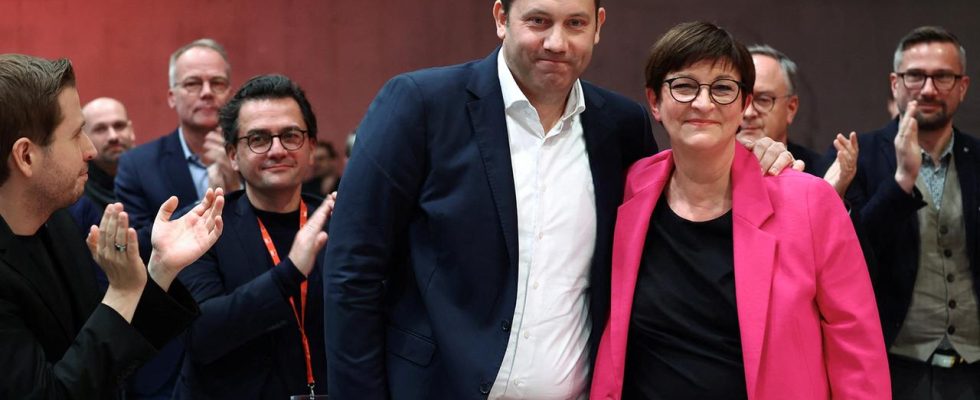Esken and Klingbeil remain at the head of the SPD: the party conference confirmed both of them in office for another two years. Esken received 82.6 percent of the votes, Klingbeil received 85.6 percent.
Lars Klingbeil and Saskia Esken remain the dual leadership of the SPD Chancellor’s Party. At the federal party conference, the two were elected as chairmen for another two years. Klingbeil received 85.6 percent of the votes, only slightly less than 86.3 percent in 2021.
With 82.6 percent, Esken achieved a significantly better result than two years ago with 76.7 percent. The 62-year-old Esken has been SPD chairwoman for four years. In 2019, together with Norbert Walter-Borjans, she prevailed in a runoff election of SPD members against today’s Chancellor Olaf Scholz and his current Construction Minister Klara Geywitz.
After the 2021 federal election, in which the SPD became the strongest party for the first time in almost 20 years, Klingbeil, now 45, moved up to the dual leadership for Walter-Borjans. Up to this point he was general secretary and managed the election campaign from which Scholz ultimately emerged as chancellor. Klingbeil said it was “a great honor to be able to lead our proud social democracy in the next two years.”
Call for reform of the debt brake
In their application speeches, Klingbeil and Esken advocated a reform of the debt brake anchored in the Basic Law – a demand that the party conference then agreed to. “We reject rigid limits on borrowing by the federal and state governments, as we currently find in the constitution,” says the party executive’s lead motion, which was passed by the party conference on Friday in Berlin. “They prevent investments and impair the state’s ability to act.”
Unrest in the party
The SPD is currently at a low point in the polls. In the Sunday question of the ARD-DeutschlandTrends, the SPD recently achieved 14 percent – compared to 25.7 percent in the 2021 election. According to the survey by infratest dimap, the three traffic light parties together fell from 52 percent in 2021 to 33 percent today.
Next year there will be the European elections, three state elections in East Germany and several local elections. The big question here is: Will the AfD’s soaring and simultaneous crash of the traffic lights continue, which has been exacerbated by the current budget crisis?
While the party’s dual leadership saw their task in the first two years of their term in office primarily as supporting the first SPD head of government in 16 years in the difficult three-way alliance with the Greens and FDP, the signs are now pointing to raising their profile. Crushing election defeats in Hesse and Bavaria, dissatisfaction with the traffic light course in migration policy and, most recently, the budget crisis have brought unrest into the party.
Klingbeil sees dual leadership as a “sign of stability”
When Klingbeil announced his renewed candidacy, he viewed this step as a “sign of stability” in turbulent times. He has already achieved a lot together with Esken. “But we’re not finished yet.”
Esken recalled that she became party leader in 2019 with the aim of winning the 2021 federal election. “I want to say very clearly: This is our goal now too. We have elections ahead of us that we want to win.”

